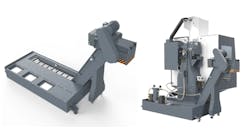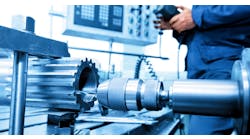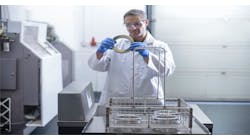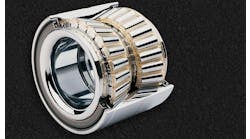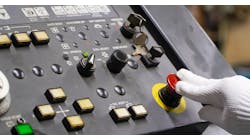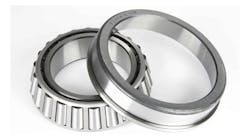2025 Outlook for Manufacturing Technology
Perfecting Cleaning for Metal Parts
Lockheed Offering Security-Focused AI
Rugged Industrial Panel PCs for HMI
Tri-Mack responds to rising demand with new lightweight materials, aggressive turnaround, and support for NPI
The scale of business expansion in the commercial aerospace industry is not limited to the OEM, but those producers’ demand for new product and materials designs that will help to keep jets’ operating costs in line is guiding an exceptional level of growth and development for manufacturers in the aerospace supply chain. And, this is a trend that expected to continue, as demand for new commercial aircraft is seen driving industry-wide growth of approximately seven percent annually, or more than 50% by 2021.
Tri-Mack Plastics Manufacturing Corp. in Bristol, RI, manufactures high-performance engineered components for aerospace OEMs, and it is taking full advantage of the OEMs’ demand: the 40 year-old company recently hired almost three dozen new employees, opened a new Advanced Composites Center, and has further plans to expand its thermoplastic composite parts and assemblies operation.
The Advanced Composites Center processes TPCs that offer lightweight but strong alternatives to heavier materials. Among the benefits of TPCs are:
• TPCs are continuous fiber-reinforced materials with exceptional mechanical properties. Tri-Mack works with prepreg tape and fabric—unidirectional and woven carbon and glass fibers in a high-temp polymer matrix—PEEK, PPS, PEI, etc.
• TPCs offer 10x the mechanical properties of injection molded plastics and are up to 70% lighter than metals.
• Tri-Mack uses automated equipment to lay-up the unidirectional prepreg tape, consolidate low-void laminates and thermoform complex shapes. Lay-ups can be tailored to align fiber orientation to optimize the performance of the finished part.
• TPCs are processed in minutes, not hours as for thermoset composites. Unlike thermosets, TPCs’ cost-effective manufacturing does not require freezers, autoclaves, or hand lay-ups.
• Tri-Mack produces hybrid components that combine the performance of TPCs with injection molding to create complex assemblies. Hybrids feature the key advantages of both processes: the outstanding mechanical properties of thermoplastic composites and the low cost of injection molding.
A recent project involved qualifying over 200 part numbers for a large aerospace OEM at an accelerated schedule. By converting the parts from steel to TPC, Tri-Mack was also able to achieve an average weight savings of 40% for the customer.
“A tremendous amount of development goes into every aerospace project,” said president Will Kain. “Naturally, at times this strains capacity at the OEM level. We’ve always viewed our role as that of a valued supply chain partner, helping our clients complete their projects and meet their weight-savings goals.”
Kain offered that Tri-Mack’s customer-service approach is to make itself an extension of the customers’ engineering teams. “In this partner role, we are helping customers by increasing our facility size, staff, and by adding cutting-edge research and technology,” he said. Beyond manufacturing parts, “we’re managing processes, data and aggressive new product introduction schedules. This leads to success for all the parties involved.”
In addition to its Advanced Composites Center, Tri-Mack offers injection and compression molding, precision multi-axis machining, tool making, and a robotic injection-molding cell.
“Going forward, Tri-Mack’s continuous investment in capital equipment, technology and people ensures that we will be able to further increase our capacity, as well as offer our customers the very latest manufacturing technologies,” said Kain.
